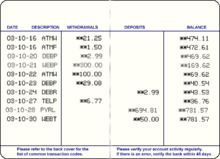
Back ሴቪንግ አካውንት Amharic حساب توفير Arabic Дэпазіт Byelorussian Дэпазыт BE-X-OLD Спестовна сметка Bulgarian সঞ্চয়ী হিসাব Bengali/Bangla Compte d'estalvis Catalan Spořicí účet Czech Spareinlage German Καταθέσεις Greek
| Part of a series on financial services |
| Banking |
|---|
 |
A savings account is a bank account at a retail bank. Common features include a limited number of withdrawals, a lack of cheque and linked debit card facilities, limited transfer options and the inability to be overdrawn. Traditionally, transactions on savings accounts were widely recorded in a passbook, and were sometimes called passbook savings accounts, and bank statements were not provided; however, currently such transactions are commonly recorded electronically and accessible online.
People deposit funds in savings account for a variety of reasons, including a safe place to hold their cash. Savings accounts normally pay interest as well: almost all of them accrue compound interest over time. Several countries require savings accounts to be protected by deposit insurance and some countries provide a government guarantee for at least a portion of the account balance.
There are many types of savings accounts, often serving particular purposes. These may include accounts for young savers, accounts for retirees, Christmas club accounts, investment accounts, and money market accounts. Some savings accounts also have other special requirements, such as a minimum initial deposit, deposits made regularly, and notices of withdrawal.